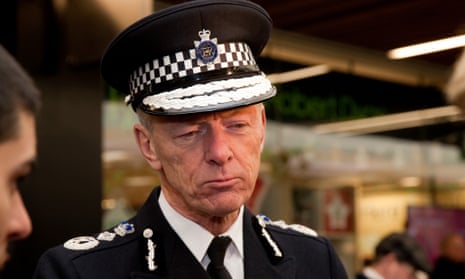The families of three teenage girls from London who are feared to have joined Islamic State (Isis) in Syria have called on the Metropolitan police commissioner, Sir Bernard Hogan-Howe, to apologise, after Scotland Yard issued a misleading statement, which the police had to retract hours later.
Schoolfriends Shamima Begum, 15, Kadiza Sultana, 16, and Amira Abase, 15, travelled from east London to Turkey last month and then crossed into an Isis-controlled area of Syria.
Sky News reported on Sunday night that the girls were believed to be in a house in Raqqa with a British girl who had been in contact with them online, and had helped bring them to Syria via Turkey.
Counter-terrorism experts in the UK believe about 50 British women and girls have travelled to Syria. Many are believed to be based in Raqqa, the eastern Syrian city that has become an Isis stronghold.
On Saturday the Met issued a statement apparently rejecting the families’ key claim that they had not been told that a 15-year-old friend of the girls had gone to Syria weeks earlier. The Met said the families had been told in December 2014 by the deputy headteacher of the Bethnal Green Academy, which all the girls had attended.
Hours later the Met retracted this claim, citing “further discussions with Bethnal Green Academy”.
The Met statement followed media interviews with the families on Friday. The families told the Guardian that the Met had failed to give them crucial information that could have prevented their daughters from joining Isis. They also accused the force of covering up their errors since the girls went missing.
On Tuesday the families will appear before MPs on the home affairs committee to tell of their concerns. Also testifying will be Hogan-Howe.
Tasnime Akunjee, the solicitor for the families, said: “I would encourage the commissioner in his upcoming select committee appearance on Tuesday to do the right thing by these distraught parents and say sorry. It is a disgrace that the Met in their original press release effectively accused their families of being liars.
“The families have expressed that the deepest source of upset in this affair has been the failure by the police to inform them of the fact that the first girl to go missing had gone to Syria, a fact that was only known to them after their own children had also gone missing.
“It is precisely the failure to communicate this key piece of information which disabled the family from intervention in the children’s plans.”
Police accept that they wrote letters to the parents saying their children had been friends with the pupil who had gone abroad and asking for permission to take formal statements. But instead of delivering the letters directly to the parents, police handed them on 5 February to the girls themselves, who hid them in their school textbooks in their bedrooms. The families only found the letters after the girls left on 17 February.
The Met statement did appear to show some contrition stating: “With the benefit of hindsight, we acknowledge that the letters could have been delivered direct to the parents.”
The disappearance of the 15-year-old girl in December led to a counter-terrorism investigation that saw Begum, Sultana and Abase identified as friends of the missing girl and being spoken to by detectives.
Police say nothing at this stage identified the three girls as being at risk of falling for the lure of Isis propaganda.
Renu Begum, sister of Shamima, told the Guardian: “We would have been able to prevent it if we knew there was a terrorism investigation by SO15 [Scotland Yard’s counter-terrorism command]; it would have made us know how serious it was … We were not in the loop, we were kept in the dark.”
Halima Khanom, elder sister of Kadiza, added: “We did not know how serious the first situation was. Knowing my sister was very close to that girl, if we had known we would have taken steps.”
The families say they have grown disenchanted and frustrated by the alleged lack of answers to their questions from the police and school, and are angered by the failure to tell them their loved one’s classmate and friend had months earlier gone to join Isis.
All three told the Guardian their faith in the police had been damaged.
Fahmida Aziz, the elder cousin of Kadiza, said police had been “very manipulative” since the disappearance, adding: “I personally don’t have any faith in the police. They have really failed us.”

Comments (…)
Sign in or create your Guardian account to join the discussion